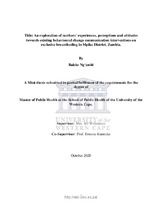| dc.contributor.advisor | Wilkenson, Jill | |
| dc.contributor.advisor | Kunneke, Ernesta | |
| dc.contributor.author | Ng’ambi, Baleke | |
| dc.date.accessioned | 2021-03-19T07:31:02Z | |
| dc.date.available | 2021-03-19T07:31:02Z | |
| dc.date.issued | 2020 | |
| dc.identifier.uri | http://hdl.handle.net/11394/8001 | |
| dc.description | Magister Public Health - MPH | en_US |
| dc.description.abstract | World Health Organisation and UNICEF recommend exclusive breastfeeding (EBF) for the first six months and continuation of breastfeeding for two years and beyond. Despite this recommendation, EBF rates have not been optimal globally, with coverage ranging from 1% - 23% in Europe to 0.3% - 73% in sub Saharan Africa. In Zambia, despite recording an increase in EBF during the first six months of life from 61% (2007) to 73% (2014), there is a rapid decline in EBF as infants get older during the first six months, from 94% among infants aged less two (02) months to 45% among infants aged 4 to 5 months. This study explored mothers’ experiences, perceptions and attitudes towards existing Behavioural Change Communication (BCC) interventions and the possible influence thereof on the adoption of exclusive breastfeeding among mothers of infants under six months in Tazara and Chilonga areas of Mpika district. | en_US |
| dc.language.iso | en | en_US |
| dc.publisher | University of Western Cape | en_US |
| dc.subject | Exclusive breastfeeding | en_US |
| dc.subject | Behavioural change communication | en_US |
| dc.subject | Experiences, perceptions and attitudes | en_US |
| dc.subject | Baby-friendly hospital initiative | en_US |
| dc.subject | Breastfeeding mothers of infants less than 6 months | en_US |
| dc.title | An exploration of mothers’ experiences, perceptions and attitudes towards existing behavioural change communication interventions on exclusive breastfeeding in Mpika District, Zambia. | en_US |
| dc.rights.holder | University of Western Cape | en_US |

